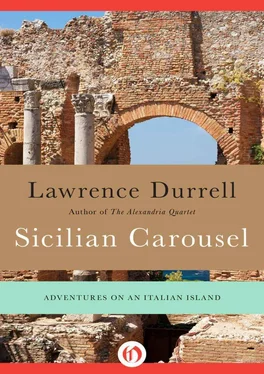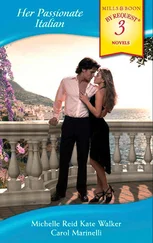Sleep had almost wrapped me up when I felt a restraining hand upon my arm, and Roberto stood smiling before me. “We are off,” he said, and as if to underline the thought the far-off bus gave a little whiffle of sound. Languidly we returned to it to find Mario sitting on the step sorting out his first aid kit with pensive attention. “Yes,” said Roberto catching my eye, “we must take every precaution. You tourists are capable of anything from dysentery to sunstroke, from fever to broken bones. And it’s always our fault! That is why we carry a full medical kit with us.” He had hardly uttered the words when the American dentist advanced and requested a Band-Aid as he had cut his finger in some mysterious way. More classical was the wasp sting incurred by one of the French ladies. Pleased to show his medical prowess, Roberto whipped out his tweezers and drew the sting before drenching the wound in ammonia. “He’s right,” said Deeds, “people are such fools anything could happen.” And so we rolled down the dusty inclines towards the far off blue promise of a first sea bathe, though truth to tell the little beach was not the prettiest I had ever seen, and there was quite a disturbed little sea running. Beddoes would have things to say about it!
But no. He just sat and scowled upon the shingle, sucking at his pipe. The rest of us showed a commendable burst of energy, changing into our bathing costumes in a nearby thicket and advancing intrepidly towards the sea, which frolicked about in a disconcerting manner — at least for those who did not, or could not, dive through the waves which broke on the shore, in search of the relative calm beyond. The American dentist’s lady friend behaved too irresolutely, too pensively, and was knocked down in a heap — or perhaps she had decided to fall in just this beautiful soft waxen way. We all rushed to help in order to get our hands on that beautiful form but her man was there ahead of us, alive to every eventuality. Deeds bumped his toe. The pebbles were blazing hot and we all scuttled about with burning soles, to cool them at last in the innocent surf. I swam a little, regretting that I was not in better shape physically: a winter of French cooking had done me in. Perhaps the modest fare of Sicily — if one could defeat its copiousness — might do the trick? But no, because when one traveled this way one was always famished, and the only choice lay between spaghetti and rice.…
The sea tasted of oysters and brine when I inadvertently swallowed a mouthful. Some anxiety was now caused by the German beauty who had apparently decided to swim over to Piraeus, so far out was she. (She explained later that she was simply keeping pace with the sinking sun.) But how was Roberto to know this, as he stood shouting at her on the brink and wringing his responsible hands? She was finally persuaded to come back to us, which she did at a smart crawl — to be fiercely rebuked by the guide who said he would post no more letters for her unless she showed more good sense. But she seemed unaware that she had done anything to cause alarm and annoyance. She shook out her blonde hair and of course the gallant soul of Roberto melted, his wrath cooled like lava. But the sun was already behind the hills and the night had begun to fall. We should arrive after dark in Syracuse — the town which Martine had esteemed superior to all the towns of Sicily. We dressed once more, relaxed into happy fatigue by water and sun, and recovered the saturnine Mario and our little bus — together with all the belongings we had left in it. The atmosphere of the interior was now becoming ever so faintly disorderly — the disorder of gypsies who have no time to be tidy when they are on the road. Binoculars, scarves, Thermos flasks, picnic baskets and cameras; we carried all this lumber with us like all modern pilgrims do, and Mario watched over it all while we were absent, sitting to play himself a hand of patience on a little board erected over the wheel; or else to study a Sicilian paper with great care and slowly while he sucked a match stick which he had carved into a toothpick.
Darkness fell while we were on the road; the familiar daylight forms receded and melted slowly away into the tenebrous hinterlands around us. We put on coats and scarves and settled into our seats, glad of the warmly lighted bus which we could feel burrowing its way through the darkness towards Syracuse. Mario played his chuckling horn, sometimes it seemed for pure pleasure as there was hardly any traffic on the road. It was a horn on two notes, like a magpie’s rattling call. In silent villages he let out this pretty call sign to register our presence. Answer came there none. Then as we climbed a hillock and took a smooth curve Roberto announced that we had reached Augusta and this was well worth sitting up for.
It was of an extraordinary beauty, this little oil port. A thousand tulips of light and colored smoke played about its derricks and towers and drums — a forest of refineries whose beauty was made quite sinister by the fact that the whole was deserted. There was not a soul in the whole place, not a dog, nor a cat: there wasn’t even a guard post. Yet the light played about in it, the smoke gushed and spat, as if it were the very forge of the Titans, and a thousand invisible trolls were hard at work in it. Its beauty was quite breathtaking. I watched it in diminishing perspective, reflected in the windows of the bus, and it seemed like a thousand wax lights afloat on the waters of chaos. Two days later we were to pass it in daylight and to have our ardor quenched by its hideous ugliness, its ungainly spider-like instruments. But indeed it was an important guarantee of Sicily’s economic progress. No more would she be a poor relation of the north. Roberto spared us statistics tonight out of sheer tact, and because he knew that in two days’ time he could spout them all out by daylight. “Augusta,” said Deeds shaking his head. “All through the damn war we tried to shell it, with never a single hit. How could it have escaped? But it did.” I thought I knew the answer. “Every time the Fleet Air Arm tried to bomb Augusta or even Catania the Italians came back and knocked a piece off my balcony in Alexandria. Finally there was no balcony left.” The little spots of light receded into the rolling hills, until Augusta looked like a small forest fire, or the brindles on a tiger’s hide. It hung for a while like a sinking constellation and then extinguished itself while ahead of us, more warming but less spectacular, glowed the lights of Syracuse. We had begun to feel hungry and watched with a certain envy the Americans who poured out coffee from a vacuum flask and ate a sandwich in a lingering way. I thought that, after all, I would sleep like a lead soldier tonight once I had had dinner and a drink.
Marble Stele: Syracuse
One day she dies and there with splendor
On all sides of her, for miles and miles,
Stretches reality in all its rich ubiquity,
The whole of science, magic, total time.
The hanging gardens of folly, the aloof sublime,
Just as far as thinking reaches,
Though lost now the nightingale’s corroboration
Of spring in meadows of dew uprising.
Only the avid silence preaches.
“Whence came we, blind one?” asks the nursery rhyme,
“And whither going, say?” The cherub questions us
“In the dark of his unknowing clad
He charms eternity, makes all process glad.”
Time has made way at last, the dream is ended
Least said is soonest mended.
Hear old Empedocles as calmly wise
As only more than mortal man can be
Who stands no nonsense from eternity.
“The royal mind of God in all
Its imperturbable extravagance,
Admits no gossip. All is poetry.
There is no which, nor why, nor whence.”
Читать дальше











